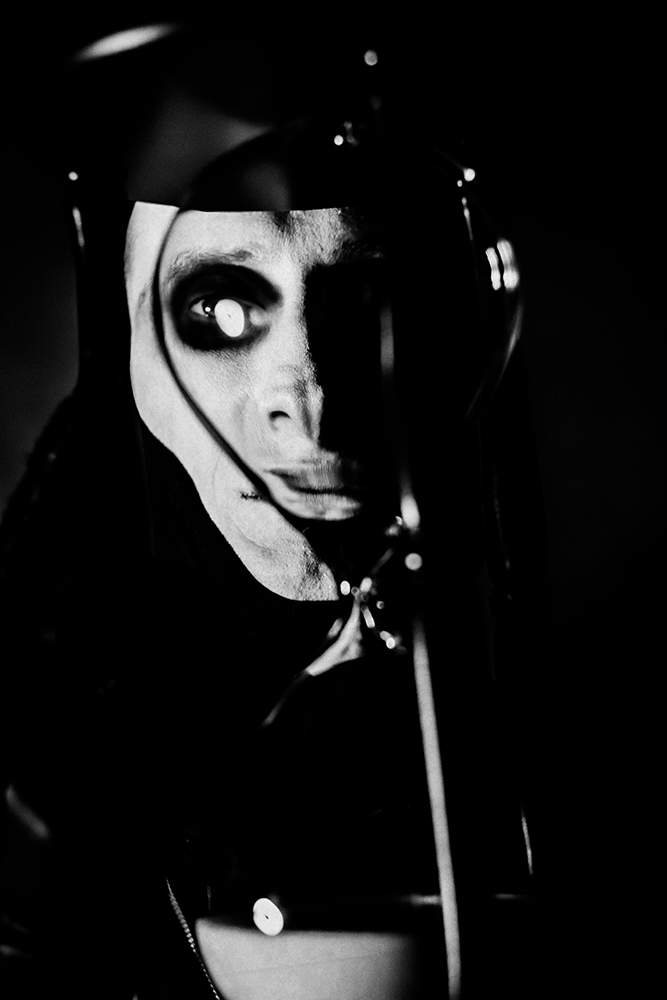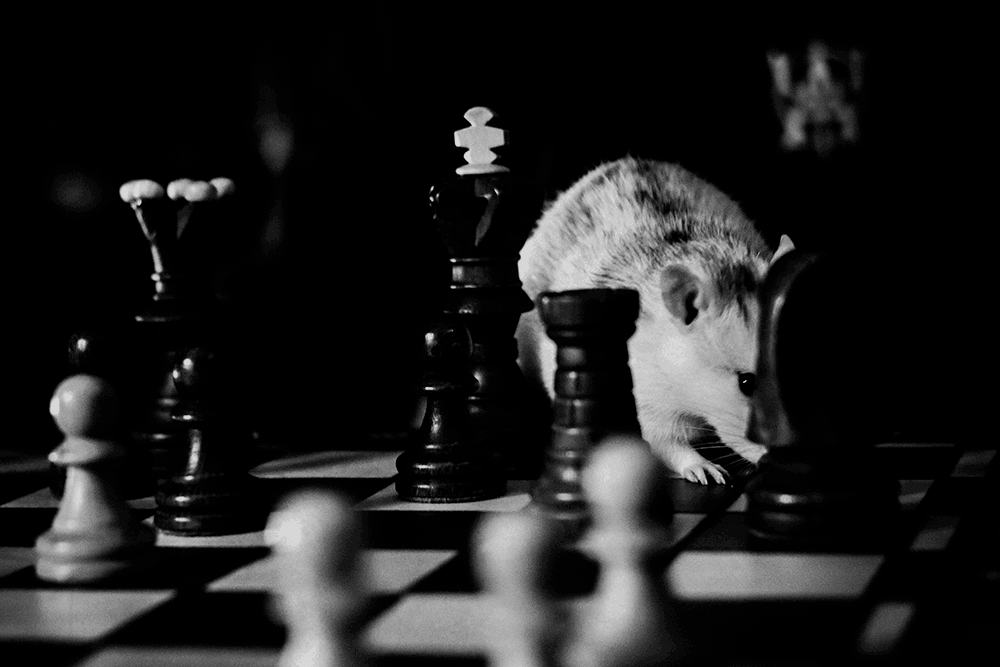Mānbryne
2021-05-06
by Niklas Göransson
In pursuit of faith – a conversation about death and contemplations on mortality with Sonneillon and Renz of Polish black metal band Mānbryne.
– MĀNBRYNE is a black metal band, says Sonneillon, one which draws musical inspiration from the genre’s most influential years: the 90s and early 00s. Our themes revolve around humanity’s perpetual pursuit for meaning through faith, religion, or philosophy – including a good amount of disillusion, doubt, and deconstruction of one’s own beliefs.
The project’s debut album, “Heilsweg: O udręce ciała i tułaczce duszy”, was released by Malignant Voices and Terratur Possessions in April 2021. The idea behind MĀNBRYNE was conceived a few years ago when vocalist Sonneillon heard some musical ideas that guitar player Renz had been working on.
– At first, he was just sharing a few random riffs during our casual music discussions. Despite the material being somewhat rough around the edges, it was obvious to me that he has a lot of potential which would be a great shame to let go to waste. His sense for melancholic and solemn melodies resonated with me instantly… you know, chills down the spine, unexplained euphoria, and so on. I had no choice but to suggest a collaboration. I asked him to write a full song, from start to finish, instead of a collection of loosely put-together riffs. That’s how the first sketch of “Ostatni splot” – initially called “With Fearsome Alchemy” – came to life. Upon hearing it, I instantly felt one hundred percent convinced that this was exactly what I’d been missing in life since OREMUS was put to rest. It’s funny to recall all this now, as I remember jokingly telling Renz at some point to ‘just write some BURZUM rip-off’. Obviously, it didn’t go quite according to plan.
– I started with demo versions consisting only of basic guitars and drum machine lines, says Renz. Finding a decent metal drummer is difficult, so I kept working with digital percussion. I used a simple solution of two matching guitar tracks panned to each side, expanded by leads wherever necessary. At first, our plan was to make an EP, so I wrote two songs – “Ostatni splot”, and “Pustka, którą znam” – and then we started looking for a drummer. After Priest gave us a positive response, he convinced us to do a full-length instead.
Was any of this created in a practise room, or were the songs fully written before you started rehearsing?
– We never actually rehearsed the music. Priest lives far away from us, so he just listened to the demo versions and then recorded his parts to guitars and metronome tracks. He did an amazing job.

Everything besides drums – which were recorded in the studio – was tracked by the members themselves, using home setups, and then mixed by Marcin Rybicki of Left Hand Sounds.
– For the past six years, says Sonneillon, I’ve been able to record vocals at home whenever inspiration strikes and my health allows. We are lucky to live in times when near-miraculous technology like modern recording equipment and apps are not only available at our fingertips but also somewhat affordable. So, unless you’re aiming at fancy amps or expensive microphones, you’re able to record some decently sounding tracks by yourself – while still avoiding this terrible bedroom black metal feel, if you know what I mean. Of course, all of it must then be mixed and mastered properly; but again, we are lucky to have friends who are also sound engineers. In this case it was Marcin, who also happens to play guitar in my other band. So, everything stays in the family.
I was a bit surprised to learn that Renz – the album’s primary composer – is a relative newcomer in terms of playing in bands. In fact, this is his first-ever recording. Furthermore, I’m not sure if he’s just being modest, but he describes himself as a mediocre guitarist.
– It doesn’t really have anything to do with modesty: I’m a left-handed guy playing guitar right-handed. When I first started, at the age of seventeen, I didn’t have enough money to buy the instrument immediately. Instead, I relied on friends for a long while and, of course, it wasn’t possible to change the string order just for the sake of my left-handedness. By the time I could finally buy my first guitar, it was a bit too late to change this habit. So, I just let it be, knowing it might affect my playing skills. Also, I have no musical education – except for private piano lessons when I was a kid, but I doubt I remember much of what I learned there. Lastly, I barely ever practise these days and don’t really play black metal except when composing.
Some of the bass lines, such as the ones in “Majestat upadku”, are really well-done – is this your work?
– No. They, along with most of the guitar leads in “Pustka, którą znam”, were composed and recorded by Wyrd – by far one of the best musicians I’ve ever met. He not only successfully decoded my lousy tabs, but also added a wonderful new layer to the music. I personally love when the bass guitar plays something on its own.
I was also impressed upon reading what I first assumed to be rather ambitious translations of the Polish lyrics. As it turns out, these were the originals – the album was initially meant to be sung in English.
– Actually, says Sonneillon they are a mix of both. Some lines were directly translated to Polish from the English originals, whereas others had to be almost completely re-written. I didn’t find them to be as satisfying as I wanted and felt as if I had to pay more attention to details. Then, I had to translate the final, corrected lines back into English again to keep them consistent with what I’m singing on the album. Kinda confusing, I know, but the idea of doing everything in Polish came to me suddenly, somewhere along the line, and I couldn’t resist its impulse. I’m glad I did, because it made the record a whole lot better.
You said that the word ‘mānbryne’ means ‘the fire that swallowed a man’ – what language is this?
– Old English. As far as I’ve been able to determine from online research, it means either precisely that or ‘destructive fire’, or ‘fever’. I came across the word while carrying out some research and it instantly caught my eye. I found its meaning, sound, and look very appealing; it was exactly what we were looking for. We wanted something short, striking, and odd sounding. Another ‘fire-something’ in modern English would just be boring and uninspired, whereas a short Polish name would probably provoke unnecessary comparisons to MGŁA. Which – as much as I respect the band – I was looking to avoid, since we most certainly don’t want to be associated with all those hood-core bands that started popping up after their success.

Sonneillon stated in an interview with Polish magazine Noise that MĀNBRYNE is the ‘spiritual successor’ to OREMUS – a side-project he once had with fellow BLAZE OF PERDITION member XCIII. In 2011, they released an album called “Popioły”. I’m assuming the common denominator here is the heavy conceptual influence from Ingmar Bergman’s 1957 cinematographic masterpiece The Seventh Seal.
– Indeed, this movie had a huge influence on “Popioły”. There is even a song called “Siódma Pieczęć” (‘The Seventh Seal’), making this fairly obvious. Unfortunately, despite all my years of nagging, XCIII has no further plans for OREMUS and wants to focus solely on BLAZE OF PERDITION. I felt as if we had barely scratched the surface with “Popioły”. I was young and still pretty much growing up. As ambitious as it was for a twenty-three-year-old kid, the whole endeavour left plenty of room for evolution. Also, as you know, death has quite literally come knocking on my own door, which only increased my appetite for such themes. A decade has passed and everything I’ve been through along the road, both good and bad – but perhaps mainly bad? – has helped me achieve something that’s been on my mind for years. I was too young and inexperienced to really grasp and execute this to one hundred percent back then.
Sonneillon made a really good point in the aforementioned interview. He noted that the quest of the film’s main protagonist – Antonius Block, a knight searching for meaning in a volatile world ridden with plague – is as relevant to our time as the 14th century.
– Well, says Renz, now it seems relevant to point out that this album was in progress long before the pandemic arrived. Even though the disease doesn’t seem to be nearly as deadly as the medieval plague, all the doubts and questions Block was unable to answer has become much closer to the average person.
– Although the film itself is as old as my father and depicts events taking place in medieval Europe, continues Sonneillon, I don’t think the existential questions it raises have been answered. Perhaps they never will be? Blind faith and religion used to be the pillars which kept humans from falling into the void, but today we know that all they offer are vague promises of salvation and some unclear and sketchy moral guidance. It’s safe to assume that it doesn’t really satisfy modern man’s hunger for knowledge. And still – as much as our civilisation’s knowledge about the world has grown and progressed – we must ask ourselves if we’ve really learned more? Actually, modern science makes it far harder to believe there to be any meaning to life at all. The feeling of emptiness becomes heavier for each passing day, and it seems like neither philosophy nor religion is especially helpful as humanity gets increasingly secularised. That’s why I believe our pursuit for meaning is still highly relevant: we simply haven’t found it.
How much of these lyrics are Antonius Block speaking, as opposed to you?
– Although all of us are unique individuals born in different times, I believe we are just as miserable, clueless, and lost as von Sydow’s doubtful knight. My own crisis of faith is long gone though, and I’ve had nothing in common with Christianity for much longer than it was part of my life in the first place. I don’t even know if it’s right to call my experience a ‘crisis’, as I don’t really remember actually believing in any of it. I’d say it was just a natural influence of the environment I grew up in. Still, while we may free ourselves from religion, we can’t really do the same with existence itself – nor everything that comes with it. Unless we’re talking about manually ending it, of course. But I’m not the suicidal type, so I had to find a way to process my doubts and thoughts. And thanks to the many talented people I’ve met along the way, I have a creative outlet to do so instead of drowning in this inner dirt and allowing it to consume me. I started writing lyrics just for myself, long before I was ever part of a band: this only confirms that the urge to express myself came naturally. So, to answer your question, I’d say we are both speaking. Doubt is always there, even now, because I don’t really believe in final answers or absolute truths.



